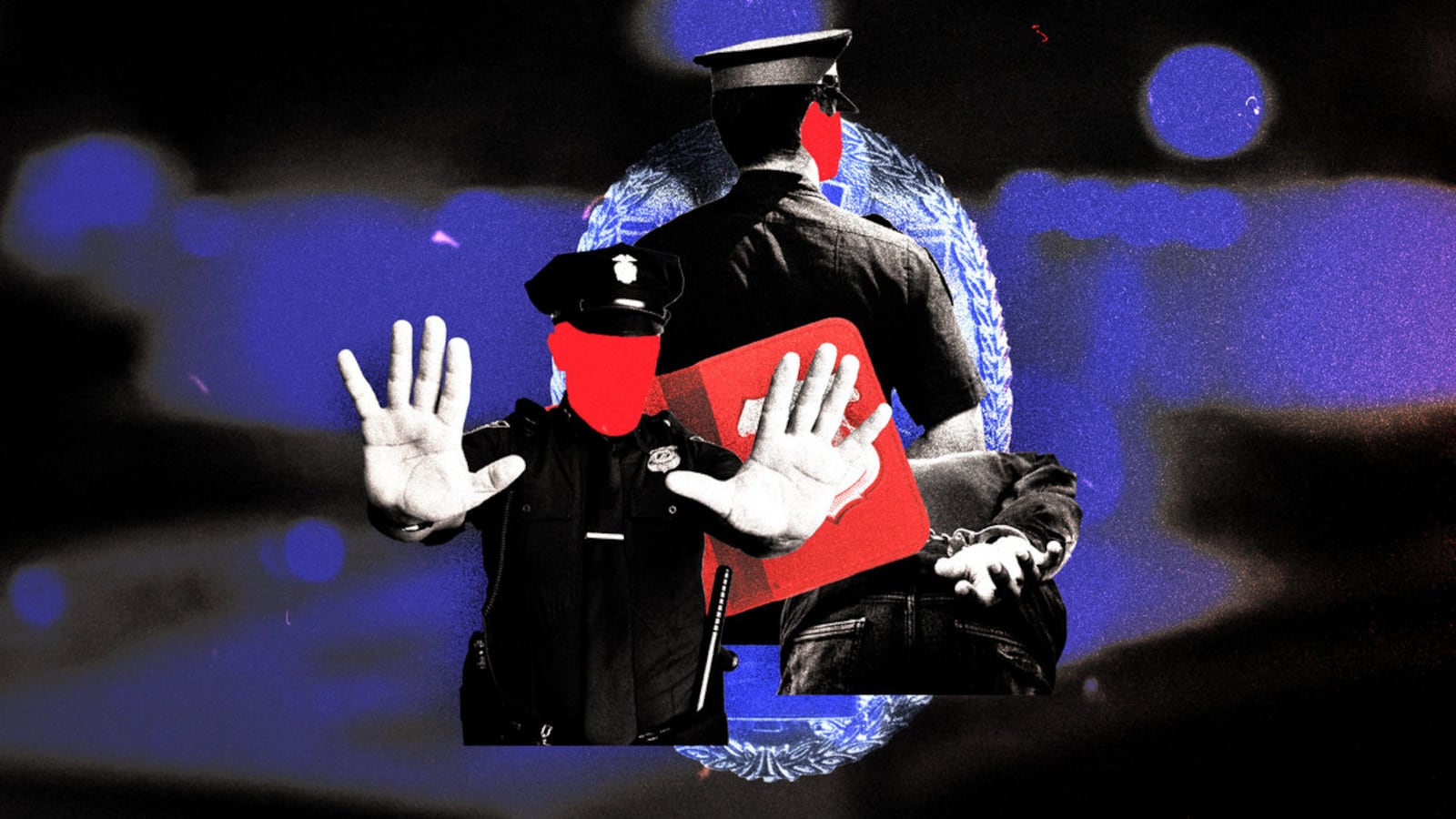Patrol officers took no chances when they confronted a man claiming to be a federal agent in Dublin, Ohio, a small city about 20 miles north of Columbus. They drew their weapons first and asked questions later.
Bodycam footage)" href="https://urldefense.com/v3/__https:/www.youtube.com/watch?v=gb1MVFDy_tw__;!!LsXw!V7ttywEndbgyIeNFJghDCdFnvLnkDjOWx0sxqGTng6nlNOftVSoIooqpUVdq_KKRoLIjX-xjAuSlp1x0whBYjA$">Bodycam footage captures the rapidly escalated standoff from summer 2020. After shouting contradictory commands at the man and forcing him onto the ground at gunpoint, two officers tased and handcuffed him. They then put him—still restrained—in the back of a patrol car for more than an hour while they checked out his story, which turned out to be true.
The detainee was James Burk, a special agent with the Bureau of Alcohol, Tobacco, Firearms, and Explosives (ATF), following up on a tip about an illegally owned gun. But because Burk did not don a uniform or carry a warrant, a woman at the condominium he came to visit called 911 instead of opening her door.
When officers arrived, Burk identified himself as a federal agent and explained that his badge was in his pocket. But the officers were not persuaded.
Six months after the incident, Burk filed a civil rights lawsuit against the acting officers from the Columbus Division of Police. Predictably, Burk now finds himself on the wrong end of a judge-made doctrine called “qualified immunity.”
The doctrine, which the U.S. Supreme Court invented in 1982, shields government employees from accountability for unreasonable actions—unless victims can point to a prior case in the same jurisdiction that clearly establishes the behavior as unconstitutional.
The irony of this case is that law enforcement officers like Burk normally love qualified immunity.
The National Association of Police Organizations says qualified immunity is essential for officers to do their jobs. “Without it, the orderly administration of justice would come to a halt amidst paralyzing fear of liability,” the group asserts in a 2020 letter)" href="https://urldefense.com/v3/__https:/www.napo.org/files/2915/9259/5684/NAPO_Letter_Qualified_Immunity.pdf__;!!LsXw!V7ttywEndbgyIeNFJghDCdFnvLnkDjOWx0sxqGTng6nlNOftVSoIooqpUVdq_KKRoLIjX-xjAuSlp1zqLtNu6w$">letter to Congress. The International Association of Chiefs of Police agrees)" href="https://urldefense.com/v3/__https:/www.theiacp.org/sites/default/files/IACP*20Statement*20on*20Qualified*20Immunity.pdf__;JSUlJQ!!LsXw!V7ttywEndbgyIeNFJghDCdFnvLnkDjOWx0sxqGTng6nlNOftVSoIooqpUVdq_KKRoLIjX-xjAuSlp1xo329VSw$">agrees.
One police department in New Hampshire even advertised qualified immunity as a job perk)" href="https://urldefense.com/v3/__https:/whdh.com/news/nh-police-department-under-fire-for-listing-qualified-immunity-as-job-perk-in-recruitment-post/__;!!LsXw!V7ttywEndbgyIeNFJghDCdFnvLnkDjOWx0sxqGTng6nlNOftVSoIooqpUVdq_KKRoLIjX-xjAuSlp1wNFCRN7Q$">job perk for new recruits in 2021. Who wouldn’t want to avoid consequences for workplace wrongdoings and willful incompetence?
The perks for federal officers are even greater. They receive near-absolute immunity, no matter how outrageous their behavior. A Department of Homeland Security (DHS) agent even dodged civil penalties after he attempted to shoot and kill)" href="https://urldefense.com/v3/__https:/ij.org/press-release/supreme-court-ignores-constitutional-violations-by-federal-police-green-lights-absolute-immunity-even-in-cases-dealing-with-attempted-murder-and-well-documented-lies-by-officers/__;!!LsXw!V7ttywEndbgyIeNFJghDCdFnvLnkDjOWx0sxqGTng6nlNOftVSoIooqpUVdq_KKRoLIjX-xjAuSlp1xZMa5ivg$">shoot and kill Kevin Byrd, a Texas man who asked questions about a drunk-driving incident involving the agent’s son.
Our public interest law firm, the Institute for Justice, represented Byrd when he petitioned the U.S. Supreme to consider his case. The justices declined. Instead of reining in government immunity, they continue to solidify and expand it.
In June 2022 the Supreme Court all but ruled)" href="https://urldefense.com/v3/__https:/www.supremecourt.gov/opinions/21pdf/21-147_g31h.pdf__;!!LsXw!V7ttywEndbgyIeNFJghDCdFnvLnkDjOWx0sxqGTng6nlNOftVSoIooqpUVdq_KKRoLIjX-xjAuSlp1wXJi52FQ$">all but ruled that federal officials can never be sued for violating the Constitution. Police groups celebrated the decision, which cuts off the only path to justice available to civil rights victims.
Rogue officers can still face criminal prosecution or internal discipline, but that does nothing to provide a remedy to those who experience government misconduct. Even if it did, such discipline is rarely taken. Law enforcement agencies are notoriously bad at policing themselves. For instance, Burk kept his job as an ATF agent after he was charged with shoplifting wine)" href="https://urldefense.com/v3/__https:/www.wcpo.com/news/local-news/hamilton-county/delhi-township/james-burk-atf-agent-charged-with-stealing-wine-from-kroger__;!!LsXw!V7ttywEndbgyIeNFJghDCdFnvLnkDjOWx0sxqGTng6nlNOftVSoIooqpUVdq_KKRoLIjX-xjAuSlp1yXzAp5bw$">shoplifting wine from an Ohio grocery store in 2015.
Now the two-tiered justice system could work against Burk, as he learns what it means to be the plaintiff against a government defendant. Already, the police officers he is suing have raised qualified immunity as an affirmative defense, which means a judge could excuse them from liability even if Burk proves they violated his constitutional rights.
Many victims of government abuse know the frustration, but Burk’s situation comes with a twist. As a federal agent, he is trying to sue local officers for misconduct, yet he would enjoy absolute immunity for himself if the roles were reversed.
Burk cannot have it both ways. Accountability either matters, or it doesn’t. Either immunity is necessary for government officials to do their jobs, as police groups argue, or immunity undermines the rule of law—which requires one set of rules for everyone.
Even though our nation is premised on the idea that first come rights, and then comes government, all too often, it is not until someone is lying face down on the pavement in handcuffs that they understand the importance of our constitutional protections.
Immunity doctrines must end if constitutional rights are to mean anything. If a federal agent with a badge in his pocket can face excessive force and then have his efforts at accountability stymied, then what chance do the rest of us have?








